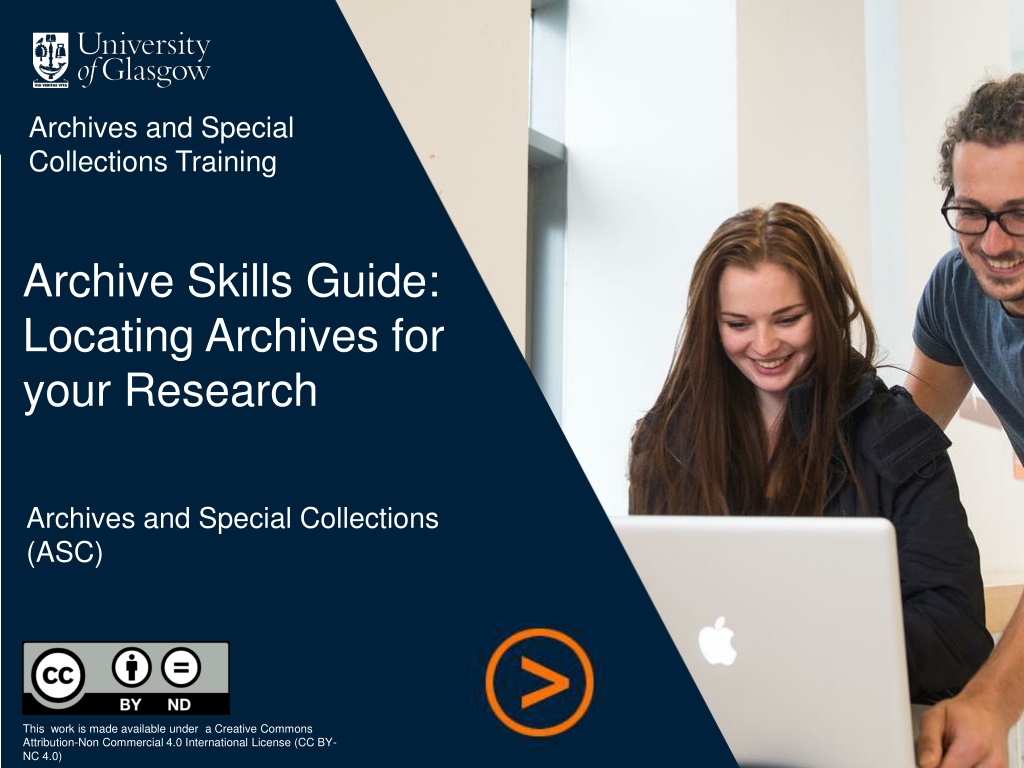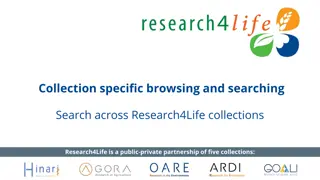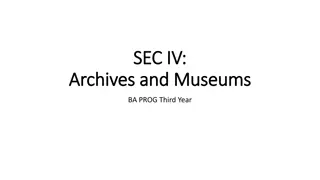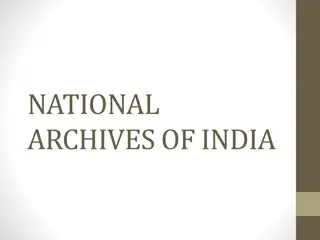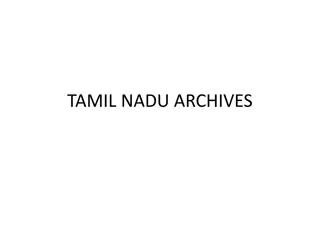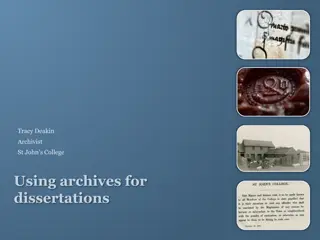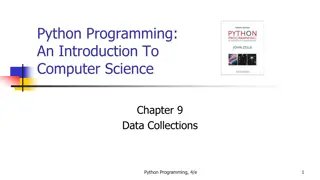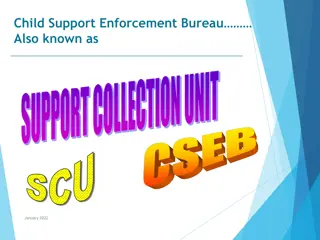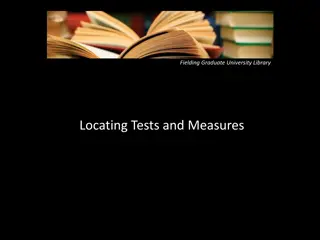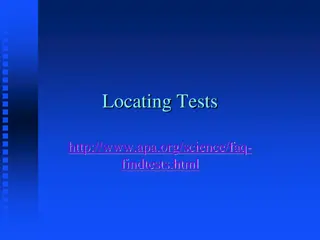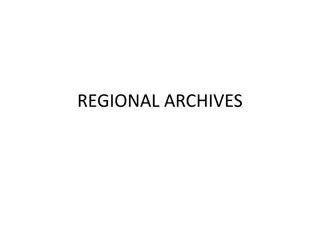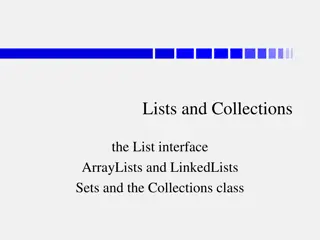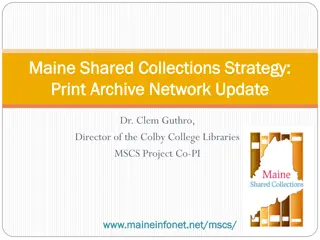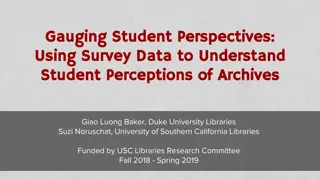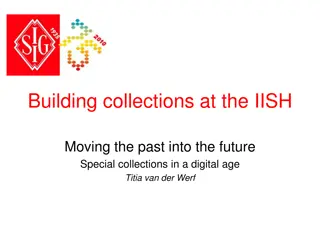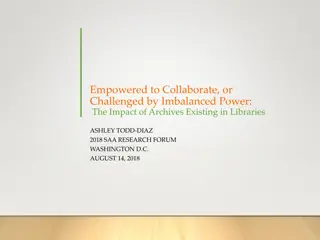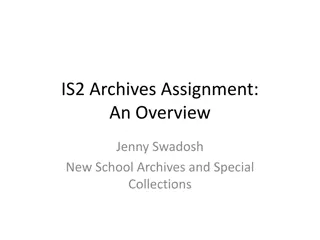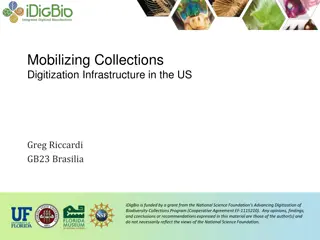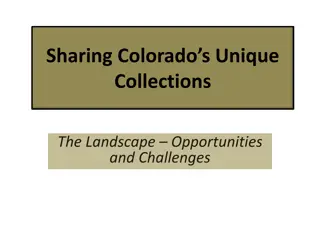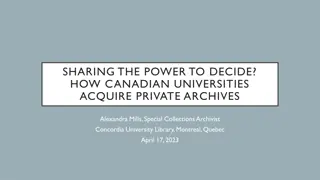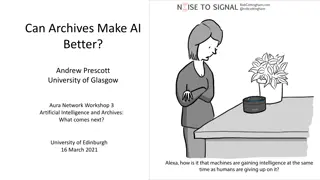Tips for Locating Archives and Special Collections for Research
When simple searches fail, follow steps like checking publication citations and considering record creators to find archives. Understanding why and how information was documented can lead you to valuable sources for research.
Download Presentation

Please find below an Image/Link to download the presentation.
The content on the website is provided AS IS for your information and personal use only. It may not be sold, licensed, or shared on other websites without obtaining consent from the author. Download presentation by click this link. If you encounter any issues during the download, it is possible that the publisher has removed the file from their server.
E N D
Presentation Transcript
Archives and Special Collections Training Archive Skills Guide: Locating Archives for your Research Archives and Special Collections (ASC) This work is made available under a Creative Commons Attribution-Non Commercial 4.0 International License (CC BY- NC 4.0)
Sometimes it can be easy to find the sources you need, for example by doing simple internet searches for the person or organisation who created the records. However where this doesn t work these are some steps that may help you to work out where you might find them.
Citations in publications: In most quality publications there will be notes about the sources used. Sometimes this will be in the form of footnotes for each reference or the author may have put together an appendix giving a detailed list of the sources consulted and where they can be found. An example of the appendix approach, see appendix from University, City and State (1 page, 862kb), the first page of the Sources and Bibliography section from University City & State - The University of Glasgow since 1870, by Michael Moss, J. Forbes Munro and Richard H. Trainor.
Think about record creation and creators: Things are written down for any number of reasons but not everything is kept permanently as a record. Think through such things as: Why would anyone have written down or otherwise recorded the type of information you are interested in? For example: Was there a legal or regulatory requirement? Did they want to share information with other people like colleagues, customers or friends?
Think about record creation and creators: Who would have recorded it? For example: Would it have been an official central organisation like a court or governmental organisation? Would it have been an individual writing for personal reasons? If the subject could not write, would the local lawyer or minister have recorded it on their behalf? Would they have needed a professional like an accountant to do the work for them?
Think about record creation and creators: How would they most likely have recorded it? For example: Filling out a form like a census return Making a film or sound recording Writing a letter Why would anyone have kept it? For example: Because they were required to keep it by law? Sentimental or family history reasons? Accidental survival hidden in an attic?
Think about record creation and creators: Why might it NOT have survived? For example: The creator or creating organisation didn t think it was worth keeping as a record. This may or may not be a deliberate, conscious act. The paper they used may have been very fragile. If it was recorded on an early computer disc it may not now be recoverable. It may have been destroyed or lost in conflict. See for example the story of the University s original Papal Bull. http://www.universitystory.gla.ac.uk/papal-bull/
Think about record creation and creators: Where might the record be now? Some archives are still held by their creating body, for example the Royal Bank of Scotland Company Archive and some are held in collecting repositories like the Churchill Archives Centre. An online directory of the main places in the UK that archives are held is provided by the UK National Archives. For sources outside the UK, a good starting point is the International Council on Archives' Regional Branches page - choose a region, select "useful links", and you'll find the addresses of the main archives in the countries of that region.
Where might the record be now? (continued) Many archive repositories have collecting policies on their websites to tell you what they do and help you decide whether it is worth contacting them. For example: Archives and Special Collections at the University of Glasgow UK National Archives National Archives of Scotland London School of Economics Cheshire Archives and Local Studies
Published archive guides: There are many published guides to archives of different organisations held in University of Glasgow Library.
Online archive resource discovery portals: In addition to just doing general internet searches for records or record creators, there are many local, national and international gateways. The UNESCO Archives Portal lists thousands of resources all over the world. Those used most commonly by the University of Glasgow s archivists are: Discovery (the UK national register of archives) - a database of worldwide archive collections that relate to British history. The Archives Hub - national gateway to descriptions of archives in UK universities and colleges. The Scottish Archive Network - a catalogue of many archival resources held in Scotland.
People to ask for help with finding archives: If you are a current student, the obvious person to ask is a course lecturer who is supervising you in undertaking this work. They should be able to help you to start looking in the right place. The University of Glasgow s Archivists can also help our staff and students to think through the possible places that information may be retained. Make an appointment via our website. If we don t think we are the best people to advise you, we will tell you who else to contact.
More in the Archive Skills Guide collection Planning your visit to use archives What to expect when you get there Reading old handwriting (Palaeography) Latin skills Legal issues when consulting and using archives Historical currency, weights, measures and dates
Contact us To learn more about ASC, our services and how we can support you, please visit our website: https://www.gla.ac.uk/myglasgow/archivespecialcollections/
Archives and Special Collections To learn more about ASC, our services and how we can support you, please visit our website: https://www.gla.ac.uk/myglasgow/ archivespecialcollections/ @UofGlasgowASC
